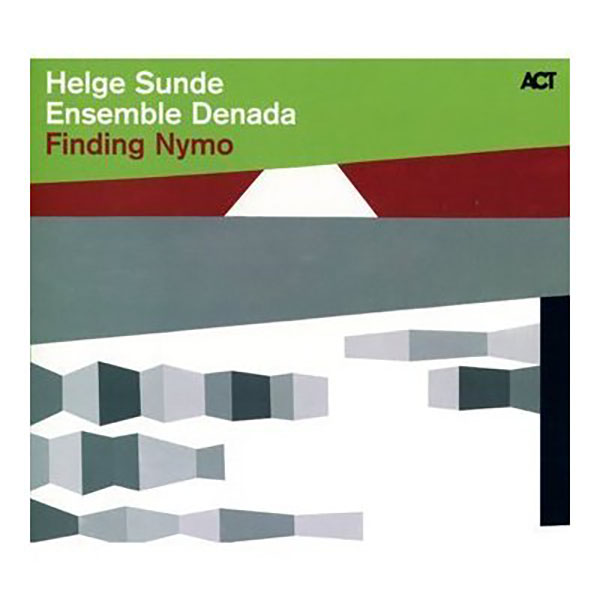
by Ian Mann
January 15, 2010
/ ALBUM
Rich, colourful and often humorous, this is a fine example of high quality contemporary large ensemble writing
The Norwegian trombonist and composer Helge Sunde made his ACT recording début with 2007’s “Denada”, an orchestral work featuring the Norske Store Orchestra and guest musicians pianist Olga Konkova and percussionist Marilyn Mazur. The two guests also appear on this latest project.
Sunde has taken the Denada name and transferred it to the jazz ensemble to be heard here. Sunde’s writing for the new disc displays an affinity with jazz composers such as Hermeto Pascoal and the UK’s own Django Bates. There is an sense of humour about Sunde’s music and a propensity to build compositions from “found sounds” that echoes the methods of those two great musical mavericks. Closer to home Sunde’s music has echoes of the large ensemble writing of his compatriot Geir Lysne. Indeed Sunde appeared on trombone as part of the ensemble featured on Lysne’s 2009 ACT release “The Grieg Code”, a recording reviewed elsewhere on this site.
Sunde has a love of puns and wordplay, both in English and his native Norwegian and these inform many of his titles. Even the name of the album is pun reflecting the presence of the saxophone playing brothers Frode (soprano) and Atle (tenor & bass clarinet) Nymo in his band, allied of course to the film title “Finding Nemo”.
The album commences with the other worldly sound of the vocoder as Ida Sunde intones the four line poem “One Word” by the Norwegian poet Olav H. Hauge. “One word/One stone/In a cold stream/I will need many stones/If I’m to get over”.
The poem segues into the playful,busy “Obstler” whose racing horn lines and bubbling rhythms recall the writing of Django Bates. Mazur’s percolating percussion is full of delightful details and solo honours go to the lithe alto of Borge Are Halvorson. The electronic embellishments by Peter Baden and Sunde himself play a significant role as does the dynamic drumming of Hakon Mjaset Johannson. For me this is the real album opener and it’s wit and energy gets the record off to a great start.
Like his label mate the German trumpeter Matthias Schriefl Sunde likes to write pieces inspired by his life on the road. “Obstler” was inspired by a type of Austrian vodka, the next three tracks, grouped together as an “Italian Suite”, were inspired by band visits to Rome, Trieste and Sicily.
“When In Rome” references the horrendous traffic to be found in the Italian capital. “Found sounds” of revving engines and other traffic noises merge with old fashioned big band swing and the rock influenced guitar of Jens Thoresen. The piece has an authentic urban feel and a strong pictorial quality.
By contrast “Valse Trieste”, is wispy and ethereal, totally opposite in feel to what has gone before. In an accomplished piece of ensemble writing Atle Nymo’s warm tenor sax emerges as the solo voice beautifully purveying a laid back, after hours feel before mutating into something altogether more powerful.
“Molto Alghero” commemorates a visit to Sicily where the thunder sampled on the track abated just in time for the band’s unplugged concert in Alghero’s town square. The performance was obviously a triumph, as captured here in the celebratory mood of the piece. Sunde’s horn voicings are superb with the Nymo brothers emerging as the principal soloists, Frode’s serpentine soprano being followed by Atle’s declamatory tenor.
The brothers are back for “Finding Nymo” itself, a quirky turbo-charged horn driven romp that frames powerful solos from Atle on tenor and Frode on soprano.
The ghostly “MoonCrier” features electronics and the eerie percussive tinklings of Mazur. The ensemble scoring incorporates Halvorsen’s alto flute and Sunde’s starkly beautiful solo trombone.
Konkova also features as a soloist for the first time playing delicate, crystalline piano.
A couple of pieces follow that reflect Sunde’s Norwegian background. “Knegg” is the Norwegian for the whinnying of a horse and this brief, quirkily effervescent piece of the same name includes hoof like percussion, plus joyous solos from Marius Haltli (trumpet) and Even Kruse Skatrud on trombone, the latter rustling up some appropriately horse like noises from his instrument.
“Bryk” is a Norwegian dialect word for noise but it begins surprisingly quietly with Konkova’s lyrical piano. However rock rhythms and electronics are soon added to the equation with solos coming from trombonist Erik Johannessen, bassist Per Mathisen and finally Konkova again. Sunde’s writing is typically colourful and chameleon like encompassing a variety of moods and styles and covering a wide dynamic range.
The closing “Lullaby Of Broltesia” ends the album on a gentle, elegiac note. Sunde’s rich scoring even incorporates the sound of someone snoring plus the surprisingly tender sound of Nils Jansen’s bass saxophone. Even here Sunde can’t refrain from adding an element of humour, Broltesia” he says “is a fantasy land where everyone listens to jazz played by large ensembles, where airline tickets for musicians are free and artists don’t have to pay taxes.”
“Finding Nymo” is a richly entertaining and often humorous record but that humour is derived from an enormous degree of musical sophistication. Sunde’s writing is witty, intelligent and colourful and his horn arrangements masterful, sometimes reminiscent of a more eccentric Mike Gibbs. The way he incorporates electronics into his arrangements is also highly impressive. If Sunde ever brings his ensemble to the U.K. they should be well worth hearing.
blog comments powered by Disqus